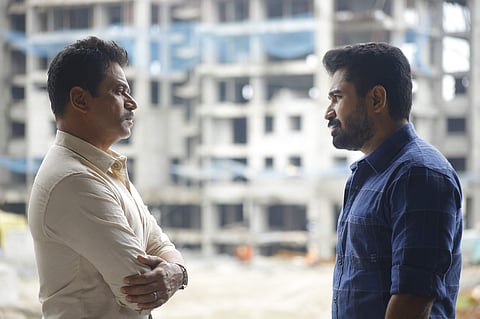Kolaigaran Movie Review: A reasonably well-made adaptation that doesn’t soar as high as it should
Rating:(2.5 / 5)
Apparently, our cinema isn’t yet done with Keigo Higashino’s The Devotion of Suspect X yet. It feels just like yesterday that Drishyam got released, and we are already here, onto the next film drawn, it seems, from the same source material. The plotline is pretty much the same. A man takes up the all-consuming task of protecting his beloved from a grisly crime, while another, a cop with a terrific instinct for solving crimes, won’t let up. It’s the one-liner, but Jeethu Joseph — regardless of his denial that his film was inspired — added so many details into Drishyam, and localised it so effectively, that it’s very, very hard not to see it as its own film. Kolaigaran isn’t as worried about any cunning overhauls, and largely remains the same as its source material. The director had tweeted that there was originally a disclaimer about this film being an inspiration of Suspect X but that it has since been removed from the film. And now, curiously enough, his tweet looks to have been deleted too. All of this really leaves a strange aftertaste…
Director: Andrew Louis
Cast: Arjun, Vijay Antony, Ashima Narwal
Having said that, Andrew Louis’ Kolaigaran is quite decently made. If the title didn’t quite make it clear what we should expect from the film, Hitchcockian violin screeches in composer Simon’s opening track makes it plenty evident. It’s a catchy, tasteful track by the composer, whose background music too, I rather enjoyed in a film that relies rather heavily on him for mood. I do wish that occasionally, they had let up a bit, and let silence take over from time to time — but it’s definitely not for want of better music work though from a composer whose songs too — despite some frustrating placement — I didn’t mind at all. Arguably, the next biggest contribution in the film comes from actor Arjun, who plays Karthikeyan, a policeman with a great instinct for solving cases. It’s truly in his portions that the film comes alive. Watch him in that interrogation scene in Dharani’s apartment, as he, while asking some basic questions, doesn’t betray that he’s observed crucial details in the room. Watch him let it slip that there’s been a murder and then observe the inmates for any unusual reactions. Watch him then casually enter the apartment of Prabakaran (Vijay Antony), and not lose his composure in the face of some cold responses. I genuinely liked him in this film, but walking out of it, it’s hard to shake off the feeling that there should have been more for him to chew on.
It’s not news anymore that Vijay Antony has limitations as an actor, but it’s nothing short of an achievement that he continues to soldier on — to quite a bit of success — carefully picking characters and films that make the most of his ability, or the lack thereof. Here too, he seems largely comfortable playing the almost boringly straightfaced, cunning Prabakaran. The nature of the character means he cannot betray much emotion, and that’s just fine by him. In the one scene that demands too much of it — where he has to bawl over a body — the difficulty of it all becomes evident.
I quite enjoyed how Kolaigaran is filmed. I liked the thought put into its transitions — a car’s boot opening transitions into a large file being opened in the next scene. I liked the thought put into the tonality of shots — every time someone has murder on their mind, the frames light up with red. I liked that the film — despite being all of 110 minutes — still takes the time to breathe every once in a while. It’s a film at ease with its material, and in control. The problem though is that its material isn’t as shocking or thought-provoking as it probably should have been.
The film’s love for details comes through quite well. It’s evident in the picturisation of a burnt corpse, in Karthikeyan and a retired cop (Nasser) sparring with their respective contrasting theories and the explanations they each offer, in even its casting (I liked that a forensics specialist is an unassuming middle-aged woman in a saree). This isn’t a film distracted by the presence of its actors; it’s admirably more concerned about its characters.
Kolaigaran, ultimately, is a police procedural, a whodunit. These films typically build tension till a big final — usually shocking — reveal ties everything together nicely. There’s also usually emotional upheaval of some sort at the centre of the crime. Here, the big reveal is one of convenience, and the true shock is its existence. As for the emotional upheaval, a couple of horribly placed songs early on causes quite a bit of it. Prabakaran doesn’t seem menacing enough; he just seems a bit nutty. His affected neighbours (played by Ashima Narwal and Seetha) don’t inspire too much empathy and don’t seem as overburdened emotionally as they should.
Ultimately, I liked the seeming sincerity with which the film looks to have been made, even if you walk out fairly underwhelmed. If this film were about something more unfamiliar, something more surprising, I would have been delighted for its existence. Right now, I’m just mildly satisfied. However, I’d any day pick a film like this over a film like Neeya 2 that has nothing to say. Sadly though, sometimes, it seems our choice is sometimes limited between films that have nothing to say and films that say what has already been said.

